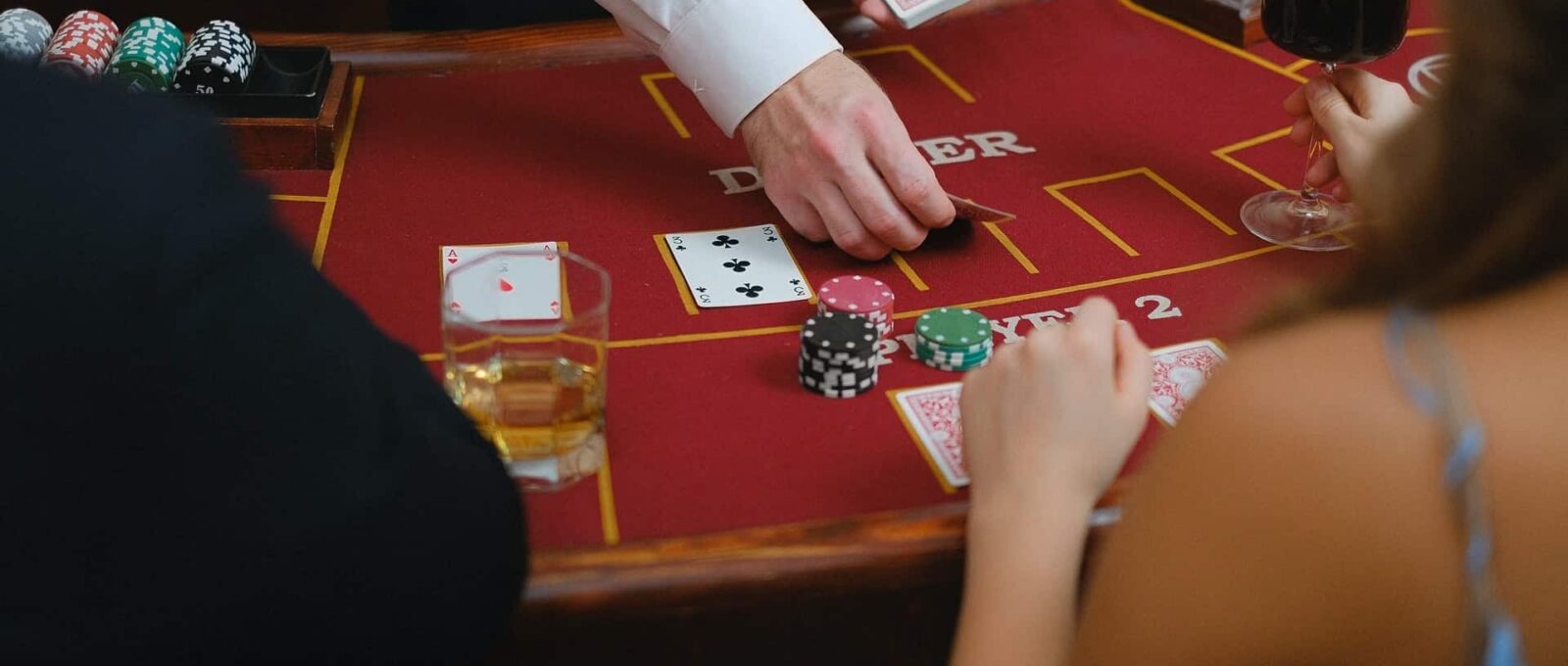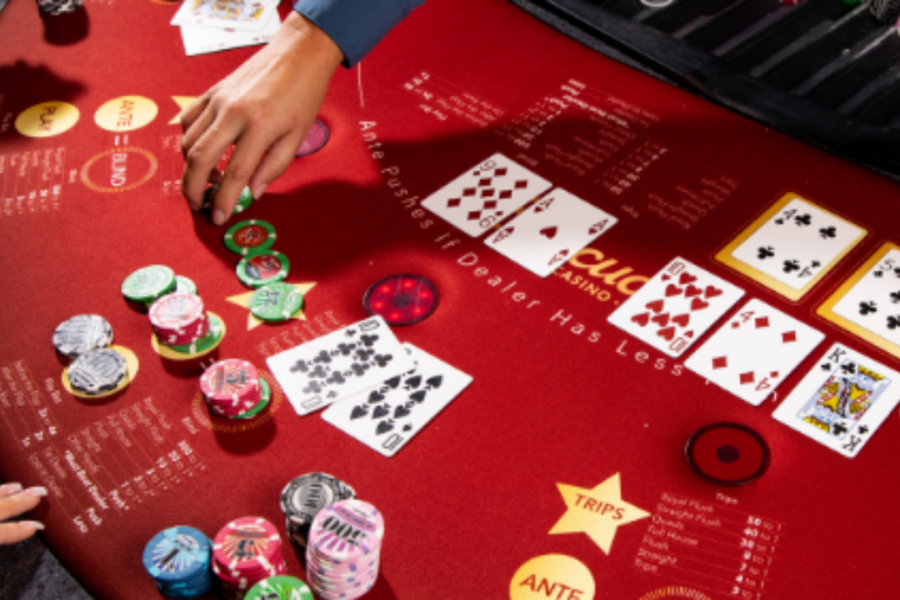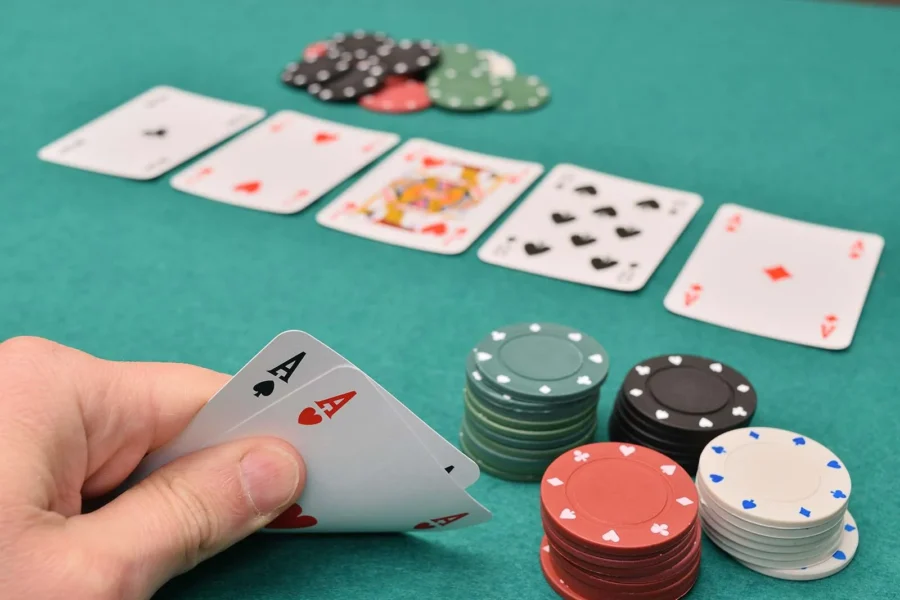Poker Rules for Beginners
Poker is not just a card game; it’s a game of minds – these words perfectly capture the essence of one of the most popular card games in the world. Starting your poker journey might seem complicated, but with the right knowledge, anyone can master its basics and enjoy an exciting game. In our article, we will provide you with essential information that will help you understand key aspects of poker, such as the hierarchy of card hands, bidding rules, and bluffing strategies. You will also learn how to prepare for your first game, how to read opponents’ behaviors, and how to manage your budget so that the game is not only a source of excitement but also a potential way to gain an advantage over other players. Additionally, we will highlight common pitfalls beginners might fall into and advise on how to avoid them.
Basic Poker Rules: First Steps
Understanding the hierarchy of cards is the foundation on which the whole game is built. Every player must know that a royal flush is the highest possible combination, while the lowest is a high card. Between these two extremes, there are various combinations like straight, flush, and full house. Knowing these combinations is essential for effective strategy planning and decision-making during the game. The basic element of poker gameplay is the bidding, which takes place in several rounds. Each player has the option to fold, check, raise, or re-raise the bets of other players. These decisions should be made based on the strength of one’s own hand but also on the observation of opponents’ behaviors and the hands they might possess. An important aspect of the game is also managing your bankroll, which is the pool of funds available for the game. Sensible bankroll management allows for longer and more effective play, minimizing the risk of losing all funds in a short period. Players should set stake limits appropriate to their experience and financial capabilities, which is crucial for maintaining a healthy balance between risk and potential winnings.
Ranking of Poker Hands: Key to Success
Getting familiar with the hierarchy of card hands is the foundation on which poker strategy is built. Experts agree that knowing and quickly recognizing different combinations can significantly increase your chances of winning. Anyone serious about the game should start by memorizing the hands, from the strongest, which is the royal flush, to the weakest, which is the high card. This knowledge is essential to make the right decisions during gameplay. Experienced players advise not only to know these combinations but also to understand their probability of occurrence and be able to assess the strength of one’s hand in the context of the visible cards on the table. This allows for better prediction of opponents’ moves and making more informed decisions, whether to fold, call, or raise. Mastering this skill requires time and practice but is invaluable in the pursuit of becoming a winner.
How to Start Playing Poker: Preparing for a Deal
Before starting your poker journey, it is essential to understand the basic rules and strategies of the game. Experts advise that beginners should focus on learning the rankings of poker hands and the bidding rules. It is also a good idea to familiarize yourself with different poker variants, such as Texas Hold’em, which is the most popular among beginners. Practicing with small stakes or in games without real money will help understand the game dynamics and the importance of table position. Remember to always play within your budget and treat the game as entertainment, not a source of income. Developing the skill of observing other players’ behaviors and adapting your strategy to the current game situation are further steps that will bring you closer to success in poker.
Bidding in Poker: Strategies for Beginners
Introduction to the world of poker requires not only understanding the rules but also developing effective bidding strategies that will allow controlling the course of the game and increasing the chances of winning. Passive and aggressive strategies are two opposing approaches that beginners should consider. A passive strategy involves cautious bidding, which can lead to minimizing losses but also limits potential gains. On the other hand, an aggressive strategy involves frequent raising, which can increase winnings but also carries higher risks. The choice of the appropriate strategy depends on many factors, including the playing style of opponents and one’s position at the table.
| **Strategy | Characteristics | Advantages | Disadvantages** |
| Passive | Cautious bidding, rare raising | Minimizes losses, better control over the budget | Limited potential to increase the prize pool |
| Aggressive | Frequent raising, high stakes | Potential to significantly increase the prize pool, pressure on opponents | High risk, potential for quick and large losses |
Bluffing in Poker: When and How to Use It?
Effective bluffing requires not only excellent knowledge of the rules of the game but also the ability to read opponents’ behaviors. Experts emphasize that the best time to bluff is when you can convince other players of the strength of your hand, even if reality is quite different. It is important not to overuse this technique, as frequent bluffing can be quickly noticed by other participants. Experienced players advise bluffing at strategic moments, such as when the game involves high stakes or when you have a psychological advantage over your opponent. A good moment is also when the cards on the table suggest that you might have a strong hand. It is essential that each bluff is well thought out and based on the observation of other players’ behaviors and the course of the game. When bluffing, it is crucial to maintain consistency in your behavior. Any inconsistency can be noticed by other players, increasing the risk of your bluff being discovered. Experts recommend staying calm and confident, regardless of the strength of your hand. Remember that bluffing is an art that requires time and practice to master perfectly.
Poker Psychology: How to Read Opponents?
Interpreting opponents’ behaviors at the poker table is as important as knowing the game rules. Analyzing gestures, facial expressions, and betting patterns can provide valuable information about the strength of the opponent’s hand. For example, in one study conducted on a group of experienced players, it was noticed that some of them unconsciously touch their nose or neck when they have weak cards. Others, on the other hand, when having a strong hand, may behave more confidently, which manifests in a louder voice or quicker decisions. Observing changes in behavior is crucial for understanding the psychology of the opponent. A case study of a well-known poker player, Daniel Negreanu, shows how important it is to focus not only on the cards but also on the players. Negreanu is known for his ability to read opponents, which has repeatedly helped him win tournaments. He pays attention to details such as the way opponents place chips or their reaction to revealed cards, allowing him to predict their next moves. This ability to interpret non-verbal signals is invaluable in poker strategy.
Bankroll Management: Finances in Poker for Beginners
Proper management of the funds allocated for the game is fundamental for anyone dreaming of long-term success in poker. Starting your adventure with this fascinating game, it is crucial to learn how to manage your budget effectively. Responsible play and financial management skills not only increase the chances of success but also protect against potential losses that can quickly discourage further play. Here are some tips on how to effectively manage your bankroll in poker:
- Set a loss limit – before you start playing, decide how much money you are willing to lose. This amount should not affect your daily life.
- Play at appropriate stake levels – choose games with stakes that match your current bankroll to avoid risking too much of your funds in one session.
- Avoid emotional playing – emotions are a bad advisor. Playing under the influence of frustration or trying to recover losses often leads to risky decisions.
- Regularly review your results – tracking wins and losses will help you understand at which level of play you are most effective and where you might need more practice or a change in strategy. Following these rules will allow you to stay in the game long-term, develop your skills, and, most importantly, enjoy playing poker. Remember, poker is a marathon, not a sprint, and strategic bankroll management is your best ally on the road to success.
Common Mistakes of Beginner Poker Players: How to Avoid Them?
Many people starting their poker journey often don’t realize how important it is to stay calm and focused on the game. Emotions can be the biggest enemy, leading to unthoughtful decisions and loss of chips. Therefore, it is crucial to learn to control your feelings and not let them negatively affect your gameplay. Another common mistake is relying too much on luck, which can result in risky moves without solid strategic foundations. Beginner players often do not pay enough attention to observing opponents and adapting their strategy to the current situation at the table. Understanding that every move should be well thought out and based on observing other players’ behaviors is key to success. Additionally, it is important not to stick to one strategy throughout the game but to be flexible and ready to change tactics when the situation at the table requires it. Mastering these skills will help avoid many mistakes and increase the chances of winning.
Frequently Asked Questions
Is online poker safe?
Yes, online poker can be safe, provided you choose reputable and licensed gaming sites. Make sure the site uses advanced encryption technologies to protect personal and financial data.
How long does it take to learn poker?
Learning the basic rules of poker can take a few hours, but mastering the game at a high level requires years of practice and continuous skill improvement.
Can you play poker for free?
Yes, many online platforms offer demo versions or tables for playing with virtual money, where beginners can practice without the risk of losing real funds.
What are the best strategies for beginner poker players?
For beginners, the best strategy is to play conservatively, focus on strong card combinations, and carefully observe the behaviors of other players at the table.
Is poker just a game of luck? No, poker is a game of skill, strategy, and psychology. Although the element of chance plays a role, long-term success depends on the player’s abilities.






Leave a Comment